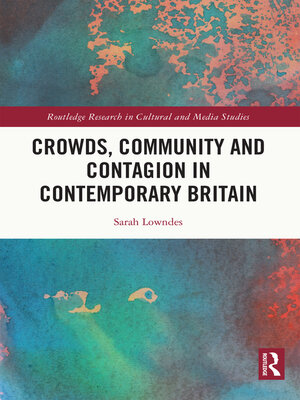Crowds, Community and Contagion in Contemporary Britain
ebook ∣ Routledge Research in Cultural and Media Studies
By Sarah Lowndes

Sign up to save your library
With an OverDrive account, you can save your favorite libraries for at-a-glance information about availability. Find out more about OverDrive accounts.
Find this title in Libby, the library reading app by OverDrive.



Search for a digital library with this title
Title found at these libraries:
| Library Name | Distance |
|---|---|
| Loading... |
Crowds, Community and Contagion in Contemporary Britain presents the COVID-19 pandemic as an opportunity to re-assess the neoliberal politics, xenophobia and racism that have undermined community cohesion in the United Kingdom since 1979, and which have continued largely unchecked through the last four decades.
Guided by three interconnected ideas used throughout to scrutinise the meaning of culture as a way of life – Welsh cultural theorist Raymond Williams' structure of feeling, Jamaican-British sociologist Stuart Hall's conception of the conjuncture and Belgian political philosopher Chantal Mouffe's agonistic pluralism – Sarah Lowndes finds that a renewed sense of mutual regard and collective responsibility are necessary to meet the unprecedented challenges of the COVID-19 pandemic. She begins by reflecting on public gatherings in Britain from 1945 to 2019, moving on to analyse five key examples of public gatherings affected by the pandemic in 2020 onwards: Chinese New Year, the UEFA Champions League Final, VE Day street parties, Black Lives Matter demonstrations, and the cancellation of Eid ul-Adha celebrations.
A thorough examination of how ideas proliferate and spread through our society, public sphere and collective consciousness, this book will appeal to scholars and upper-level students of cultural studies, cultural history, sociology and politics.







